

फिरोज गांधी की जीवनी | Feroze Gandhi Biography
Feroze Gandhi – फिरोज गांधी (फिरोज जहाँगीर गांधी) एक भारतीय राजनेता और पत्रकार थे। लखनऊ में रहते हुए उन्होंने दी नेशनल हेराल्ड और दी नवजीवन अख़बार के लिए काम किया है। वे इंदिरा गांधी के पति और जवाहरलाल नेहरु के दामाद थे।

फिरोज गाँधी की जीवनी – Feroze Gandhi Biography
1942 में उन्होंने इंदिरा गांधी (बाद में इंदिरा गांधी भारत की प्रधानमंत्री बनी) से शादी और उनके दो बेटे राजीव और संजय भी है। इस प्रकार वे नेहरु-गाँधी परिवार का हिस्सा बने। उनका बड़ा बेटा राजीव बाद में भारत का प्रधानमंत्री भी बना। 1950 से 1952 तक वे प्रांतीय संसद के सदस्य बने थे और लोकसभा के भी सदस्य के रूप में उनकी नियुक्ती की गयी थी।
फिरोज जहाँगीर घंडी के नाम से उनका जन्म एक पारसी परिवार में हुआ था। उनके पिता का नाम फरिदून जहाँगीर घंडी और माता का नाम रतिमई था, जो बॉम्बे के खेतवाडी मोहल्ला में नौरोजी नाटकवाला भवन में रहते थे।
उनके पिता जहाँगीर किल्लीक निक्सन में मरीन इंजिनियर थे और इसके बाद उनका प्रमोशन वारंट इंजिनियर के रूप में किया गया था। फिरोज अपने माता-पिता के सबसे छोटे बेटे थे, उनके दो भाई दोरब और फरिदून जहाँगीर और दो बहने तहमीना केर्शष्प और अलू दस्तूर है।
इसके बाद उनका परिवार दक्षिण गुजरात के भरूच से बॉम्बे स्थानांतरित हो गया, जहाँ उनके पूर्वजो का भी घर था। कहा जाता है की बॉम्बे के कोतपरिवड में आज भी उनके दादा का घर है।
1920 के शुरू में अपने पिता की मृत्यु के बाद फिरोज और उनकी माता अपनी अविवाहित आंटी के साथ रहने के लिए अलाहाबाद चले गये। उनकी आंटी शहर के लेडी डफरिन हॉस्पिटल में एक सर्जन थी। फिरोज ने विद्या मंदिर हाई स्कूल से प्रारंभिक शिक्षा प्राप्त की और फिर एविंग क्रिस्चियन कॉलेज से ग्रेजुएशन की पढाई पूरी की थी।
परिवार और करियर:
1930 में कांग्रेस के स्वतंत्रता सेनानियों की वानर सेना का निर्माण किया गया। इसके बाद एविंग क्रिस्चियन कॉलेज के बाहर महिला प्रदर्शनकारियों को रोकते हुए ही उनकी मुलाकात कमला नेहरु और इंदिरा गाँधी से हुई। प्रदर्शन के दौरान सूरज की गर्मी से कमला बेहोश हो गयी थी और फिरोज ने उस समय उनकी सहायता की थी। अगले ही दिन, 1930 में भारतीय स्वतंत्रता अभियान में शामिल होने के लिए उन्होंने पढाई छोड़ दी।
भारतीय स्वतंत्रता अभियान में शामिल होने के बाद महात्मा गांधी से प्रेरित होकर फिरोज ने अपने उपनाम “घंडी” को बदलकर “गांधी” रखा। 1930 में लाल बहादुर शास्त्री (भारत के दुसरे प्रधानमंत्री और उस समय वे अलाहाबाद जिला कांग्रेस समिति के मुख्य थे) के साथ उन्हें भी जेल जाना पड़ा और उन्हें फैजाबाद के जेल में 19 महीनो तक रहना पड़ा।
रिहा होने के तुरंत बाद, वे उत्तर प्रदेश के कृषि पर कोई कर ना दिए जाने वाले अभियान में शामिल हो गये और इस वजह से जब वे नेहरु के करीब रहकर काम कर रहे थे तब 1932 और 1933 में उन्हें दो बार जेल जाना पड़ा था।
1933 में फिरोज ने पहली बार इंदिरा को प्रपोज किया, लेकिन इंदिरा और उनकी माता ने इसे अस्वीकार कर दिया। इंदिरा का पालन पोषण नेहरु परिवार के आस-पास ही हुआ है। कहा जाता है की जब इंदिरा की माता कमला नेहरु की हालत टीबी की वजह से काफी ख़राब थी और इंदिरा ही उन्हें 1934 में भोवाली के अस्पताल में ले गयी थी और इसके बाद जब उन्हें अचानक इलाज के लिए यूरोप जाना पड़ा तो इंदिरा ने ही उनकी यात्रा के सारे बंदोबस्त किये थे, लेकिन अंत में 28 फरवरी 1936 को उनकी माता की मृत्यु हो गयी। आने वाले वर्षो में इंदिरा और फिरोज इंग्लैंड में एक-दूजे के काफी करीबी हो चुके थे। इसके बाद हिन्दू परंपराओ के अनुसार उन्होंने 1942 में शादी कर ली।
इंदिरा के पिता जवाहरलाल नेहरु शुरू से ही इस विवाह के खिलाफ थे और उन्होंने उन दोनों को इस विषय पर महात्मा गांधी से चर्चा करने के लिए भी कहा लेकिन इसके बावजूद नेहरु के हाँथो असफलता ही लगी। इसके बाद भारत छोडो अभियान के समय उनके विवाह के छः महीने बाद ही उन्हें अगस्त 1942 में गिरफ्तार कर जेल में डाल दिया गया। अलाहाबाद के नैनी सेंट्रल जेल में उन्हें 1 साल की सजा सुनाई गयी थी। सजा काटकर आने के बाद अगले पाँच वर्ष उन्होंने अच्छे से व्यतीत किये। 1944 में उनके बेटे राजीव और 1946 में उनके दुसरे बेटे संजय का जन्म हुआ था।
आज़ादी के बाद, जवाहरलाल नेहरु भारत के पहले प्रधानमंत्री बने। इसके बाद फिरोज और इंदिरा भी अपने दो बेटो के साथ अलाहाबाद रहने लगे और वहा फिरोज दी नेशनल हेराल्ड अखबार के मैनेजिंग डायरेक्टर भी बने। इस अखबार की स्थापना उनके ससुर (जवाहरलाल नेहरु) ने की थी।
1950-1952 तक प्रांतीय संसद का सदस्य बनने के बाद फिरोज ने 1952 में उत्तर प्रदेश के रायबरेली निर्वाचन क्षेत्र से आज़ाद भारत का पहला जनरल चुनाव जीता। इसके बाद इंदिरा भी दिल्ली से आ गयी और उनके लिए अभियान आयोजक का काम करने लगी। इसके तुरंत बाद फिरोज जल्द ही भारतीय राजनीती का अभिन्न अंग बन चुके थे। इसके बाद वे लगातार अपने ससुर जी के सरकार की आलोचना करते थे और भ्रष्टाचार के खिलाफ आवाज उठाने लगे थे।
आज़ादी के बाद के कुछ वर्षो में ही बहुत से भारतीय व्यापारी घरो ने राजनीतिक नेताओ के साथ अच्छे संबंध बना रखे थे और इसके बाद उन्होंने वित्तीय अनियमितता भी शुरू कर दी। दिसम्बर 1955 में फिरोज द्वारा उजागर किये गये केस में, उन्होंने बताया की एक बैंक के चेयरमैन राम किशन डालमिया और एक बीमा कंपनी, गैरकानूनी तरीको से सामाजिक कंपनियों और लोगो के पैसो का उपयोग कंपनी के फायदों के लिए करते थे।
इसके बाद 1957 में रायबरेली निर्वाचन क्षेत्र से पुनः वे चुने गये। 1958 में संसद भवन में उन्होंने हरिदास मुंधरा के सरकारी नियंत्रण की LIC बीमा कंपनी के स्कैंडल में शामिल होने का मुद्दा उठाया था। इसे नेहरु के साफ-सुथरी सरकार को बहुत बड़ा झटका लगा और इसके चलते अर्थमंत्री टी.टी. कृष्णामचारी को इस्तीफा भी देना पड़ा। मीडिया ने भी उस समय अपने चैनलों के माध्यम से फिरोज को काफी प्रचलित बनाया।
इसके साथ-साथ फिरोज ने बहुत से राष्ट्रिय अभियानों की भी शुरुवात की, जिसकी शुरुवात जीवन बिमा कंपनी से हुई। जब टाटा इंजिनियर और लोकोमोटिव कंपनी (टेल्को) जापानी रेलवे इंजन की तुलना में दोगुने पैसे वसूलती थी तब उन्होंने इन कंपनियों के राष्ट्रीकरण का भी सुझाव दिया था। इस वजह से पारसी समुदाय में हलचल मच गयी, क्योकि टाटा भी पारसी ही थे।
इसके बाद बहुत से मुद्दों पर उन्होंने लगातार सरकार को चुनौती देना शुरू किया और इससे बहुत से राजनीतिक दलों में उन्होंने अपनी अच्छी-खासी छवि बना ली थी।
मृत्यु और विरासत:
1958 में फिरोज को एक ह्रदय विकार आया था। उस समय इंदिरा गांधी, जो अपने पिता के साथ प्रधान मंत्री के अधिकारिक घर तीन मूर्ति हाउस में रहती थी वह उस समय भूटान की यात्रा पर गयी थी। इसके बाद वह लौटकर फिरोज को देखने के लिए कश्मीर गयी।
1960 में दूसरा ह्रदय विकार आने के बाद दिल्ली के विलिंगडॉन हॉस्पिटल में उनकी मृत्यु हो गयी। अलाहाबाद के पारसी कब्रिस्तान में ही उनका अंतिम संस्कार किया गया।
रायबरेली में एक उच्च माध्यमिक स्कूल का नाम पर उन्ही के नाम पर रखा गया है।
और अधिक लेख:
- Quotes By Indira Gandhi
- सोनिया गांधी की जीवनी
- राहुल गांधी की जीवनी
- राजीव गांधी का जीवन परिचय
- Sanjay Gandhi biography
I hope these “Feroze Gandhi Biography” will like you. If you like these “Feroze Gandhi Biography” then please like our Facebook page & share on Whatsapp. and for latest update download: Gyani Pandit free Android app.
7 thoughts on “फिरोज गांधी की जीवनी | Feroze Gandhi Biography”
Best and unique article on the internet. The special thing in this website is that, this is in hindi. So best overall.
Leave a Comment Cancel Reply
Your email address will not be published. Required fields are marked *
Save my name, email, and website in this browser for the next time I comment.
Gyan ki anmol dhara
Grow with confidence...
- Computer Courses
- Programming
- Competitive
- AI proficiency
- Blog English
- Calculators
- Work With Us
- Hire From GyaniPandit
Other Links
- Terms & Conditions
- Privacy Policy
- Refund Policy

Feroze Gandhi Birthday: फिरोज गांधी जितना गुमनाम रहे, उतनी ही आबाद रहीं इंदिरा, 'लव लाइफ' से लेकर 'सरनेम' बदलने तक की पूरी कहानी
फिरोज गांधी का जन्म मुंबई के एक पारसी परिवार में हुआ था लेकिन सोशल मीडिया पर लंबे समय तक ये प्रोपेगंडा फैलाया जाता रहा कि फिरोज मुस्लिम थे। स्वीडन के एक मशहूर लेखक बर्टिल फॉक की किताब 'फिरोज द फॉरगॉटेन गांधी' में उनके पारसी होने का प्रमाण मिलता है।.
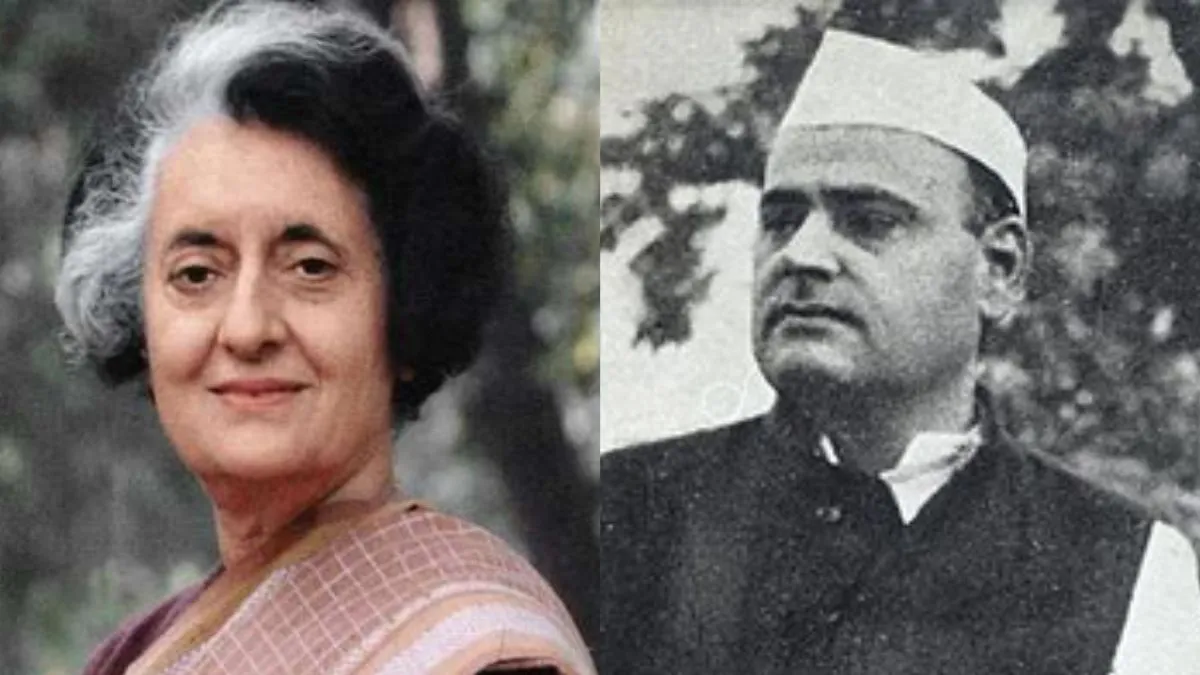
फिरोज गांधी जन्मदिन विशेष: भारत की पूर्व प्रधानमंत्री इंदिरा गांधी के पति फिरोज गांधी का आज जन्मदिन है। साल 1912 में फिरोज का जन्म मुंबई में हुआ था। वह कांग्रेस के सांसद थे और एक राजनेता होने के साथ पत्रकार भी थे। उनकी और इंदिरा गांधी की शादी के किस्से आज भी इतिहास में काफी प्रचलित हैं क्योंकि इंदिरा गांधी के पिता और भारत के पहले प्रधानमंत्री पंडित जवाहर लाल नेहरू नहीं चाहते थे कि इंदिरा और फिरोज की शादी हो। लेकिन प्रेम कहानियों को पूरा होने से भला कौन रोक सकता है। ये शादी हुई और भारत के इतिहास में ये प्रेम कहानी हमेशा के लिए अमर हो गई।
फिरोज के सर नेम में गांधी कैसे आया?
फिरोज गांधी का असली नाम फिरोज घांदी था और उनके पिता जहांगीर घांदी गुजरात के भरूच से थे, जोकि एक पारसी परिवार से ताल्लुक रखते थे। फिरोज की मां का नाम रतिमाई घांदी था। फिरोज के पिता पेशे से मरीन इंजीनियर थे। पिता की मौत के बाद फिरोज अपनी मां के साथ पहले मुंबई में रहे, बाद में साल 1915 में इलाहाबाद (अब प्रयागराज) आ गए। स्वीडन के एक मशहूर लेखक बर्टिल फॉक की किताब 'फिरोज द फॉरगॉटेन गांधी' में भी इस बात का जिक्र है कि फिरोज गांधी का जन्म बॉम्बे के एक पारसी परिवार में हुआ था और उनके पिता का नाम जहांगीर फरदूस जी घांदी था।
लेकिन सवाल ये है कि फिरोज घांदी, फिरोज गांधी कैसे बन गए? बर्टिल फॉक की किताब 'फिरोज द फॉरगॉटेन गांधी' के मुताबिक, जब फिरोज राजनीति में सक्रिय हुए तो उस वक्त के अखबारों में उनके सर नेम घांदी (GHANDHY) को गांधी (GANDHI) समझ लिया गया और वही प्रिंट होने लगा। उसके बाद से फिरोज के नाम के साथ गांधी एक ऐसे साए की तरह चिपक गया, जो कभी नहीं गया। हालांकि तमाम इतिहासकार इस बारे में अलग-अलग राय रखते हैं। कुछ का मानना है कि फिरोज ने महात्मा गांधी से प्रेरित होकर अपना सर नेम गांधी कर लिया था।
फिरोज पारसी ही थे, इस बात पर मुहर ऐसे भी लगती है कि प्रयागराज के एक पारसी कब्रिस्तान में उनकी कब्र है। ये कब्र प्रयागराज के मम्फोर्डगंज इलाके में है। फिर भी सोशल मीडिया पर ये प्रोपेगंडा फैलाया जाता है कि फिरोज मुस्लिम थे।
इंदिरा गांधी के साथ कैसे शुरू हुई लव स्टोरी?
फिरोज और इंदिरा की लव स्टोरी काफी चर्चित रही है। दरअसल इंदिरा की मां कमला नेहरू एक आंदोलन करने के दौरान एक कॉलेज के सामने धरना देते समय बेहोश हो गईं थीं और फिरोज गांधी ने उनकी बहुत देखभाल की थी। इस बीच फिरोज उनके घर जाने लगे थे, जिससे कमला का हालचाल ले सकें। यहीं पर फिरोज और इंदिरा करीब आए।
वो साल 1933 का समय था, जब 21 साल के फिरोज ने 16 साल की इंदिरा को शादी के लिए प्रपोज किया। हालांकि इंदिरा ने इस प्रपोजल को साफ इनकार कर दिया। समय बीतता गया और फिरोज राजनीति में सक्रिय होते गए। इसके बाद एक समय ऐसा आया, जब इंदिरा और फिरोज फिर नजदीक आए और दोनों ने शादी करने का फैसला किया।
हालांकि इंदिरा के पिता पंडित जवाहर लाल नेहरू इस शादी के खिलाफ थे क्योंकि दोनों के धर्म अलग थे और उनकी राजनीति इससे प्रभावित हो सकती थी। ऐसे में महात्मा गांधी ने नेहरू को समझाया और अपना 'गांधी' सरनेम उपाधि के तौर पर फिरोज को दिया। इसके बाद फिरोज और इंदिरा की हिंदू रीति-रिवाजों के साथ शादी हो गई।
जीवन के आखिरी पड़ाव पर अकेले थे फिरोज
अपनी ही सरकार के प्रति आलोचनात्मक रवैये की वजह से फिरोज के अपने ससुर पंडित जवाहर लाल नेहरू के साथ संबंध बहुत मधुर नहीं रहे। इसका असर इंदिरा के साथ भी उनके रिलेशन पर पड़ा और एक समय ऐसा आया, जब फिरोज और इंदिरा गांधी अलग-अलग रहने लगे। फिरोज जब अपने जीवन के आखिरी पड़ाव पर थे तो काफी अकेले हो चुके थे। साल 1958 में उन्हें पहला हार्ट अटैक और साल 1960 में दूसरा हार्ट अटैक पड़ा। 47 साल की उम्र में फिरोज ने इस दुनिया को अलविदा कह दिया।
ये भी पढ़ें:
मणिपुर से लेकर अंडमान तक भूकंप के झटकों से दहले लोग, इतनी रही तीव्रता
MCD ने पूरी दिल्ली से पकड़े थे दर्जनों आवारा कुत्ते, अब उनके इलाकों में वापस छोड़ेगी
राज्यों की खबरों के लिए यहां क्लिक करें
- पश्चिम बंगाल
- मध्य प्रदेश
- उत्तर प्रदेश
India TV पर हिंदी में ब्रेकिंग न्यूज़ Hindi News देश-विदेश की ताजा खबर, लाइव न्यूज अपडेट और स्पेशल स्टोरी पढ़ें और अपने आप को रखें अप-टू-डेट। News in Hindi के लिए क्लिक करें Explainers सेक्शन
- Feroze Gandhi
- indira gandhi
संपादक की पसंद

चीन ने डेपसांग और डेमचोक से 50 फीसदी सेना हटाई, जानें कब से शुरू होगी पेट्रोलिंग

देशभर में लॉरेन्स बिश्नोई गैंग के खिलाफ दिल्ली पुलिस की बड़ी कार्रवाई, 7 शूटर्स गिरफ्तार

संघर्ष और अनिश्चितता के दौर में नए मुकाम पर भारत-जर्मनी की दोस्ती, ओलाफ शोल्ज की दिल्ली यात्रा पर बोले पीएम मोदी

शर्म भी शरमा जाए, अब तो टूट गया ये 23 साल पुराना घटिया रिकॉर्ड
Explainers खबरें

Explainer: संयुक्त राष्ट्र दिवस, क्यों हुआ था संयुक्त राष्ट्र का गठन? जानिए इसका इतिहास एवं महत्व

Explainer: क्या सच में बूढ़ा हो रहा भारत? आंकड़ों ने बढ़ा दी है चिंता, जानें क्या कहती है रिपोर्ट

Explainer: कांग्रेस ने 'द' नहीं सिर्फ 'ल' सीखा, चुनाव में क्षेत्रीय दल क्यों नहीं दे रहे तवज्जो? यहां जानें

Explainer: बर्फ नहीं ये है झाग, दिल्ली की यमुना नदी में अक्टूबर-नवंबर में ही क्यों बनता है टॉक्सिक फोम?

Explainer: क्या है BRICS समिट, जिसपर टिकी है पश्चिमी देशों की नजर, जानिए अमेरिका क्यों है घबराया?
लेटेस्ट न्यूज़
- International
- Today’s Paper
- Express Shorts
- Mini Crossword
- Health & Wellness
The ‘Gandhi’ in Rahul Gandhi’s surname: The remarkable life and career of Feroze Gandhi
Feroze gandhi was a freedom fighter, mp, and husband of indira gandhi. he was the one who exposed the mundhra scandal in parliament, and was perhaps among the first people to call his wife a 'fascist'..
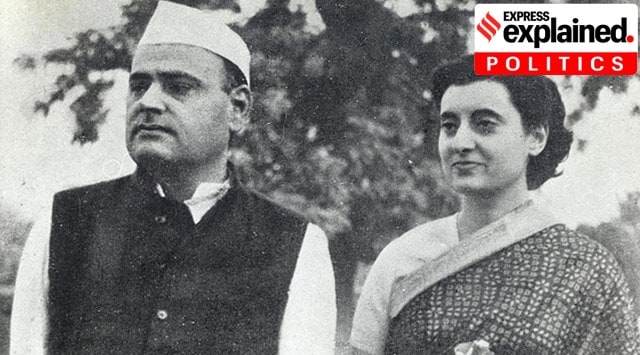
Congress leader Rahul Gandhi recently responded to Prime Minister Narendra Modi’s remarks over his last name.
PM Modi, replying to the Motion of Thanks on the President’s Address in the Rajya Sabha last week, had said: “If we miss out on mentioning (Jawaharlal) Nehru anywhere, they (the Congress) get upset. Nehru was such a great person, then why do none of them use the Nehru surname ? What is the shame in using the Nehru name?”

Gandhi hit back on February 13, saying , “I asked the Prime Minister some questions. I asked him about his relationship with Mr Adani. I asked how Mr Adani has grown so fast. The Prime Minister did not answer a single question. His response to my questions was that why are you not called Nehru, why are you called Gandhi. Because generally in India… maybe Mr Modi doesn’t understand this… But generally in India our surname is the surname of our father.”
The ‘Gandhi’ in Rahul Gandhi ’s name comes from Feroze Gandhi, his paternal grandfather, freedom fighter, journalist, and Member of Parliament from Raebareli. He passed away in 1960, a few days before he would have turned 48.
From Feroze Ghandy to Gandhi
Feroze Gandhi was born Feroze Jehangir Ghandy on September 12, 1912 in Bombay. His parents, Ratimai (née Commissariat) and Jehangir Faredoon Ghandy, were Parsis, and Jehangir worked as a marine engineer.

A young Feroze moved to Allahabad after his father passed away, to live with his aunt Shirin Commissariat, a surgeon at the Lady Dufferin Hospital. Feroze was a student at the Ewing Christian College when, at the age of 18, he had his brush with the two forces that would change his life forever – the freedom struggle, and the Nehru family.
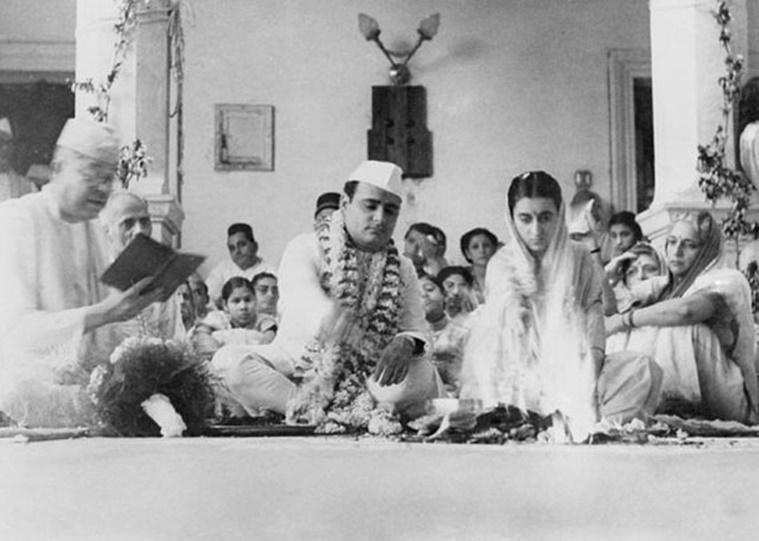
Jawaharlal Nehru’s wife Kamala Nehru, who would later become Feroze’s mother-in-law, was among the satyagrahis picketing outside Ewing Christian College. Kamala fainted in the heat and crowds, and Feroze jumped to her aid. From then on, Feroze dropped out of the British-staffed college and threw himself into the freedom struggle, spending a lot of time at Anand Bhawan, the Nehru family home and important political centre. It was also around this time that he changed his surname from Ghandy to Gandhi, in honour of Mahatma Gandhi.
Marriage to Indira Gandhi
This was the period when Feroze first came in contact with Indira Priyadarshini, Jawaharlal Nehru’s daughter, five years his junior. He first proposed to Indira when she was only 16, but Kamala Nehru objected, saying her daughter was too young.
Journalist Sagarika Ghose writes in her book Indira: India’s Most Powerful Prime Minister that over the next few years, as Kamala’s health deteriorated due to tuberculosis, Feroze remained a dependable friend to the Nehrus, even visiting Kamala at the Badenweiler clinic in Germany.
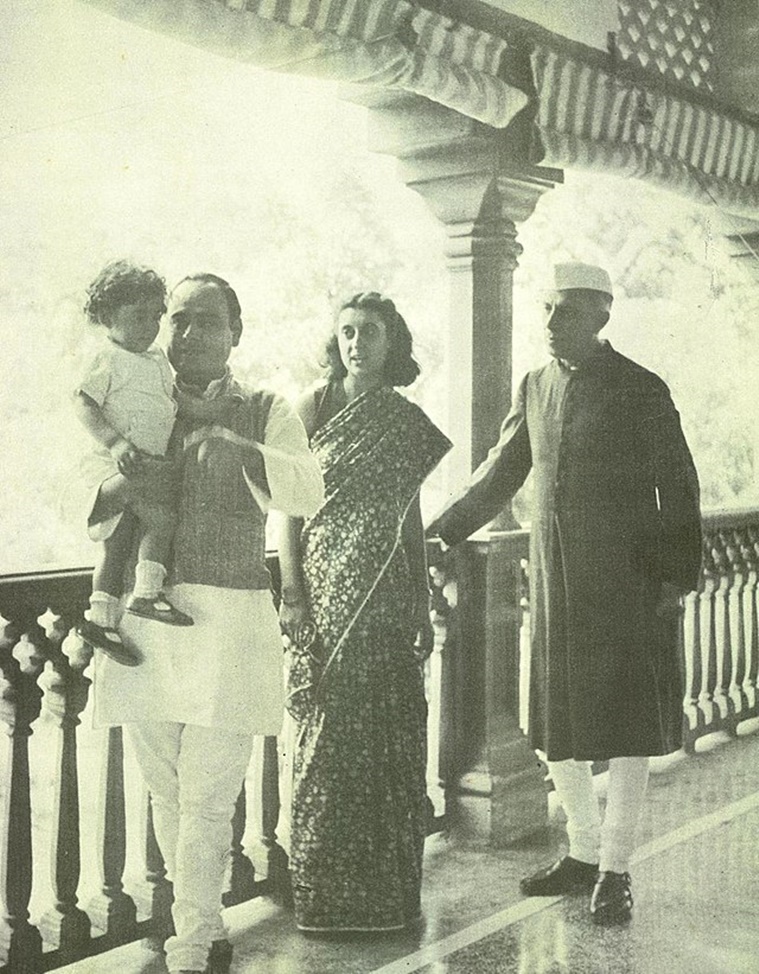
When Indira joined Oxford in 1937, Feroze was studying at the London School of Economics. Ghose writes that the young people fell in love then, with Indira becoming involved in the radical political movements Feroze was linked with, including the India League, led by VK Krishna Menon.
In 1941, they returned to India, both having dropped out of college and determined to get married. The Nehru family was not thrilled about Indira’s choice, as Feroze did not come from a similarly aristocratic lineage, but after Mahatma Gandhi blessed their union, the couple got married on March 26, 1942, on Ram Navami, at Anand Bhawan.
Feroze Gandhi as MP and journalist
After Independence, Feroze was elected MP from Raebareli. The Congress then had virtually no opposition. However, Feroze, even from the treasury benches, regularly raised his voice against the government and the party when he did not agree with them.
It was Feroze Gandhi who, in 1958, proved in Parliament that the Life Insurance Corporation’s ( LIC ) had, at the behest of high-ups in the government, invested hugely in six ailing companies owned by Haridas Mundhra , a dodgy businessman. Then Finance Minister T T Krishnamachari had to resign as a consequence of Feroze’s campaign.
Three years before that, he had exposed the financial manipulations by what was known as the Dalmia-Jain or DJ Group. His revelations led to the nationalisation of the country’s life insurance industry.
He was also the one who introduced a Private Member’s Bill making it possible for journalists to report on proceedings inside Parliament.
By now, Indira and Feroze’s marriage was deteriorating. Ghose writes that Feroze had been unfaithful, while Indira’s increased involvement with her father’s political and social life created more distance between the couple.
Journalist Coomi Kapoor, in her book The Emergency , has written that the couple’s younger son, Sanjay Gandhi, was devoted to Feroze, and “believed that his father had been abandoned and that the neglect of his well-being had led to his early death from a heart attack.”
But apart from personal differences, Feroze also disagreed with his wife politically, displaying a firmer commitment to democracy and federalism than the more authoritarian Indira.
A particularly bitter confrontation between the couple occurred over the Centre’s decision to dismiss the democratically elected Communist government of Kerala in 1959. This was when Nehru was still alive, and Indira was the Congress president. The government of EMS Namboodiripad was bringing in land and educational institutes’ reforms, which was witnessing major opposition. The central government used this unrest as a reason to dismiss the government. Among the most strident critics of this move was Feroze, who even called her wife a ‘fascist’ over this.
Swedish journalist Bertil Falk, in his book Feroze The Forgotten Gandhi , writes, “According to Janardan Thakur, well-known political correspondent: ‘It was her husband who perhaps first called her a “fascist”… The [Kerala] issue had come up at breakfast table at Teen Murti, and there had been quite a row between Indira and Feroze, with Nehru looking on very distressed. “It is just not right,” Feroze had said, “you are bullying people. You are a fascist.” Indira Gandhi had flared up. “You are calling me a fascist. I can’t take that.” And she had walked out of the room in rage.’”
On September 8, 1960, Feroze Gandhi died of a heart attack. Hindustan Times reported about his funeral that “verses from the Gita and the Ramayana, and from the Quran and the Bible were chanted. A special prayer was conducted for the departed soul by Parsi priests”.
Feroze Gandhi’s grave is in the Parsi cemetery at Allahabad, where his life had found a new direction.
- Explained Politics
- Express Explained
- Express Premium
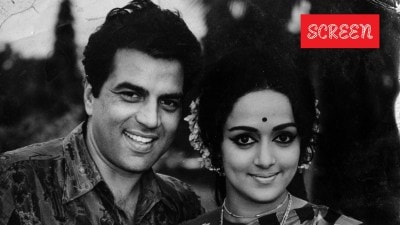
Hema Malini and Dharmendra's marriage in 1980 caused controversy as Dharmendra was already married to Prakash Kaur. Rumors of them converting to Islam and having a nikaah were spread, and resurfaced in 2004 during Dharmendra's election campaign. Hema addressed the issue and Dharmendra denied changing his religion.

More Explained

Top Stories
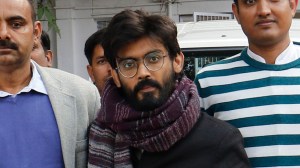
EXPRESS OPINION

Oct 25: Latest News
- 01 Credit growth for banks to slow to 12 per cent in FY25: ICRA
- 02 Arjun Erigaisi enters elusive 2800 club in live ratings, becomes only 2nd Indian after Vishy Anand to enter club
- 03 White House presses govt AI use with eye on security, guardrails
- 04 Maharashtra Assembly polls: Congress shows confidence in sitting legislators Dhangekar, Thopte and Jagtap
- 05 Maharashtra Assembly polls: Around 50 candidates from ruling and opposition file nominations
- Elections 2024
- Political Pulse
- Entertainment
- Movie Review
- Newsletters
- Web Stories
Our award-winning news reports, explainers now straight on your device
This No Is Already Registered.
Thanks For Registered Mobile No.

Feroze Gandhi Biography
Feroze Gandhi, an Indian journalist and politician, is best known as the husband of Indira Gandhi, the first female prime minister of India. Born into a Parsi family in Bombay, he had a successful career as a member of the provincial parliament and Lok Sabha. Feroze Gandhi was also renowned for his contributions to journalism, having published the newspapers ‘The Navjivan’ and ‘The National Herald.’ Despite his untimely death at the age of 47, his legacy lives on through his two sons, Sanjay and Rajiv, who both made significant contributions to Indian politics.
Quick Facts
- Indian Celebrities Born In September Also Known As: Feroze Jehangir Gandhy
- Died At Age: 47
- Spouse/Ex-: Indira Gandhi (m. 1942)
- Father: Faredoon Jehangir Ghandy
- Mother: Ratimai Commissariat
- Siblings: Aloo Dastur, Dorab, Faridun Jehangir, Tehmina Kershashp
- Children: Rajiv Gandhi, Sanjay Gandhi
- Born Country: India
- Political Leaders
- Died on: September 8, 1960
- Place of death: New Delhi
- Cause of Death: Heart Attack
- City: Mumbai, India
- Education: London School of Economics, Ewing Christian College
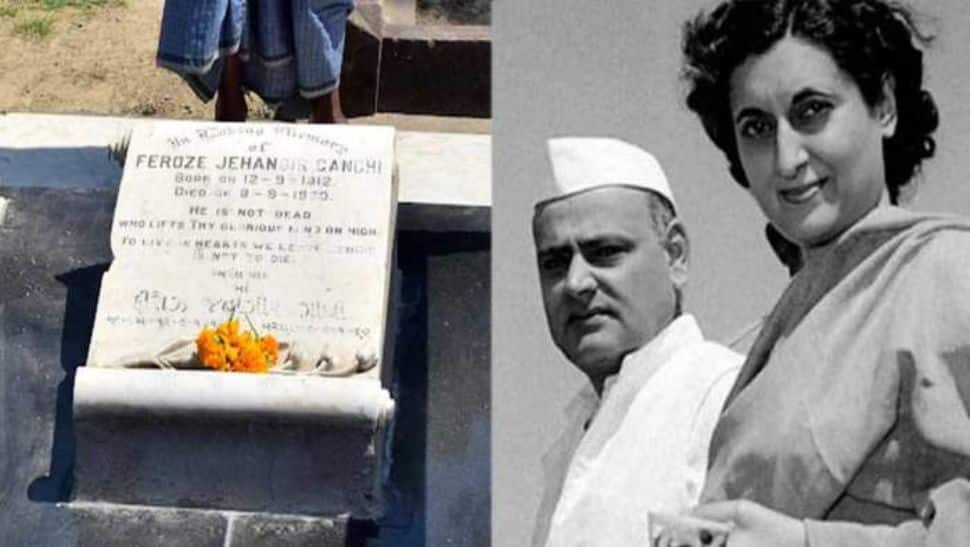
Feroze Gandhi’s Career
Feroze Gandhi joined the Indian independence movement in 1930. Inspired by Mahatma Gandhi, he changed his surname from “Ghandy” to “Gandhi”. During this time, he spent nineteen months in Faizabad jail and supported the agrarian no-rent campaign in the United Province. As a result, he was imprisoned twice.
After India gained independence, Gandhi became the managing director of the newspaper ‘The National Herald’. This was also the period when his father-in-law, Jawaharlal Nehru, became the prime minister of India. In 1952, Feroze Gandhi won independent India’s first general elections from Rae Bareli as a part of the provincial parliament.
Gandhi soon gained power of his own and began criticizing his father-in-law’s government in various ways. In December 1955, he exposed Ram Kishan Dalmia, the chairman of a bank, for his illegal ways of making money from publicly-held agencies for personal benefit. Two years later, he won the general elections again from the Rae Bareli constituency. In 1958, he raised the Haridas Mundhra scandal involving the Life Insurance Corporation. He also proposed nationalization drives and suggested the nationalization of companies like Tata Engineering and Locomotive Company (TELCO), claiming that they were selling railway engines for nearly double the original price.
Family and Personal Life
Feroze Gandhi was born as Feroze Jehangir Ghandy on September 12, 1912, in Bombay, British India. His parents were Ratimai and Jehangir Faredoon Ghandy. He had two brothers, Faridun and Dorab, and two sisters, Aloo Dastur and Tehmina Kershashp.
After the death of his father, Feroze and his mother moved to Allahabad in the early 1920s. He attended Vidya Mandir High School and later Ewing Christian College.
In 1933, Feroze Gandhi proposed to Indira, the daughter of Jawaharlal Nehru and Kamala. However, the proposal was rejected as Indira was only 16 at the time. Over the years, Gandhi developed a close relationship with the Nehru family, especially with Kamala Nehru. He was by her deathbed in 1936. In March 1942, he married Indira according to Hindu rituals, despite her father’s disapproval.
During the Quit India Movement in August 1942, Feroze and Indira were arrested. They later led a comfortable domestic life and had two sons, Rajiv and Sanjay. However, their relationship suffered due to Feroze’s continuous criticism of Jawaharlal Nehru’s government.
Feroze Gandhi passed away in 1960 in Delhi after suffering a heart attack.
Leave a Comment Cancel reply
Save my name, email, and website in this browser for the next time I comment.

Feroze Gandhi : Biography , Early Life , Education and Political Career

Feroze Gandhi Biography
Feroze Gandhi (1912-1960) was an Indian veteran journalist and politician. He served as a Managing Director of a Daily paper “National Herald” which was founded by his father-in-law Jawaharlal Nehru and also done their duty as a publisher of “The Navjivan” a daily newspaper from Lucknow which was firstly published by Mahatma Gandhi.

Feroze Gandhi was against British Imperialism and due to these harsh circumstances, he joined the Indian freedom movement for independence.
Feroze raised slogans against the British Indian dominion and was jailed many times by the government.
In 1942, Feroze Gandhi married Indra Nehru (the first female prime minister of India and the daughter of Jawaharlal Nehru).
They had two sons, Sanjay (was an Indian politician) and Rajiv, who later became the prime minister of India after the death of his mother Indra Gandhi.
Feroze Gandhi became a member of the provisional parliament for approximately two years (1950-1952) and after that, he was selected as a member of the lower house of Indian parliament “Lok Sabha”.
He was also the Member of Parliament from Rae Bareli parliamentary constituency in 1957.
Feroze Gandhi Early Life and Education
Feroze Gandhi (also known as with real name Feroze Jahangir Gandhy) was born in Bombay, India at the Tehmulji Nariman hospital situated in Bombay Fort.
He belonged to a Parsi family from South Gujarat where their forefathers’ home and his family later migrated to Khetwadi Mohalla, Bombay.
His ancestors still exist in Kotpariwad, Gujarat. Feroze was the youngest among four siblings with two brothers Faridun Jehangir and Dorab Ghandy and two sisters Aloo Dastur and Tehmina Kershashp.
His father, Jehangir Faredoon was a marine engineer in Killick Nixon and after that, he was promoted as a warrant engineer.
His mother Ratimai Jehangir Ghandy (formerly Ratimai Commissariat) lived in Bombay.
In 1920, after the death of his father, Feroze with his mother Ratimai moved to Allahabad because his maternal aunt Shirin Commissariat was living here and she was unmarried.
She was a surgeon at the city’s Lady Dufferin Hospital, therefore, there was the best place of accommodation.
He started their school education at the Vidya Mandir High School and after the completion of basic education, he graduated from the Ewing Christian College Allahabad. Later, he moved to the London School of Economics for higher education.
Feroze and Indira Nehru Marriage
Feroze first proposed to Indira when he was too young the age of only sixteen but her mother rejected it.
After that, he grew their close and intimate relations with Nehru family, especially with the mother of Indira Nehru and when she died on 28 February 1936 Feroze was at her bedside. Subsequently, in these years Feroze and Indira close to each other.
When Feroze was here in Europe to fulfill their higher education, then he joined the accompaniment of Indra Nehru (Daughter of veteran Indian leader Jawaharlal Nehru) later he proposed Indra for marriage and his proposal was accepted by Indira.
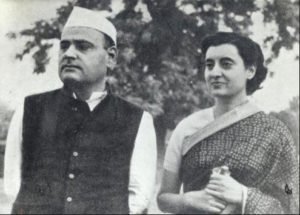
After that, they came to India and the news become spread all over India that the daughter of Jawaharlal is marrying with a Parsi(Non-Hindu) and people were against these kinds of bigot and unusual marriage then started opposing their marriage.
Feroze and Indra had already accepted the favor and protection of Mahatma Gandhi.
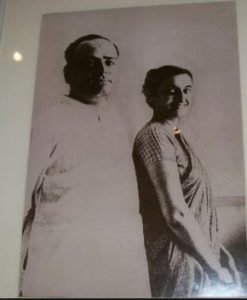
Later in the marriage ceremony of Feroze and Indra took place at Anand Bhawan (residence of Jawaharlal Nehru) on 26 March 1942.
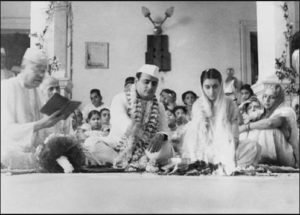
This marriage ceremony was followed by Hindu rituals, not Parsi and in 1984, photography of wedding which taken on the occasion of the marriage ceremony was used as a testimony in court.
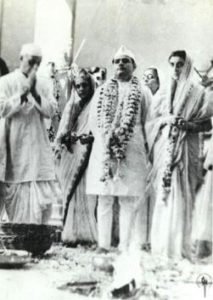
After a few years of marriage, the relationship between Feroze and Indira became deteriorated and Indira moved to her father’s home with their children (Rajiv). In those days of detachment, Feroze stayed at his Allahabad home.
Political Career
Feroze was an active parliamentarian and fearless congressman. In 1930, the formation of Congress freedom fighters wing “ The Venar Sena ”.
Feroze met Kamala Nehru (Wife of Jawaharlal Nehru) and Indira when they were picketing outside the Ewing Christian College among other women demonstrators.
Kamala loses her consciousness and became fainted due to the heat of the sun and moved her to a comfortable place.
Feroze was a real patriot and the next day he left his studies and joined the Indian independence movement. He was inspired by Gandhi and after the joining of the Indian independence movement he changed his surname “Ghandy” to “Gandhi”.
In the same year, he was imprisoned in Faizabad jail for nine months along with Lal Bahadur Shastri (the second Prime Minister of India) a top grade leader of the Allahabad District Congress Committee.
In 1932 and 1933 he was imprisoned twice while working closely with Jawaharlal Nehru on the agrarian non-rent campaign in the United Province (now known as Uttar Pradesh).
In August 1942-the same year of their marriage-Feroze and Indira participated in the “Quit India Movement” and then became arrested and imprisoned by the British government.
Feroze was also jailed for one year in Naini Central Prison Allahabad. After this kind of worse circumstance, the coming five years of their life were full of comfort and the couple had two sons Rajiv (Born in 1944) and Sanjay (Born in 1946).
After the Independence of India, Jawaharlal Nehru became the first prime minister of India and Feroze became Managing Director of “The National Herald” newspaper which was founded by his father-in-law Jawaharlal Nehru. Feroze and Indira became settled in Allahabad with their children Rajiv and Sanjay.
In 1952 – being a member of the provincial parliament (1950-1952) Feroze won the first general election of independent India from Rae Bareli constituency in Uttar Pradesh.
Indira was in Delhi then he came back and worked as his campaign organizer in the election campaign.
Feroze soon became the criticizer of his father-in-law government and raised the voice against corruption and became the Indian prominent force to gain their own fundamental rights.
He also raised the issues about various financial irregularities which were appeared after independence. He unveiled the nexus between Indian business houses and political leaders.
In 1957, Feroze was reelected from Rai Bareli Lok Sabha Constituency in Uttar Pradesh and in the parliament he raised the scandal of Haridas Mundhra (Calcutta-based stock speculator).
His personal life with Indira was not comfortable and the rift with Indira became the matter of media interest.
In 1958, Feroze Gandhi suffered a heart attack and in those days Indira stayed with her father at Teen Murti House, which was the official residence of the prime minister of India.
Indira was on the official state visit to Bhutan at that time. When she came back from Bhutan then looked after him in Kashmir but Feroze was not so well and he was weak and fragile.
After suffering a second heart attack, he died on 8 September 1960 at the Willingdon Hospital, Delhi at the age of 48.
To follow the Parsi rituals, he was cremated and after that, his ashes buried in the Parsi graveyard in Allahabad.
When his father-in-law Jawaharlal Nehru sees the huge crowd at the time of cremation then he said: “I didn’t know that the Feroze was so popular among peoples”.
The struggle of Feroze strengthened his Rai Bareli Lok Sabha Constituency in Uttar Pradesh and after his death, the seat was held by his daughter-in-law Sonia Gandhi (Wife of Rajiv Gandhi) in 2004, in 2009 and also presently in 2014.
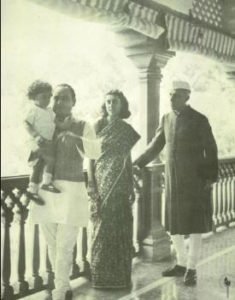
A School of Higher Education in Rai Bareli was named after him.
Read other biographies:
https://biographypoint.com/chandrashekar-azad-biography/
https://biographypoint.com/mansa-musa-biography/
https://biographypoint.com/ishwar-chandra-vidyasagar-biography/
https://biographypoint.com/anaximenes-biographyand-philosophy/
https://biographypoint.com/henry_cele_biography/
https://biographypoint.com/antonie-van-leeuwenhoek-biography/
Leave a Comment Cancel reply
Privacy overview, pin it on pinterest, biography point, categor ies.
True Leaders
Philosophers
Terms of Use
Privacy Policy
© Biography Point | All rights reserved
Privacy Policy | Disclaimer
October 25, 2024
Feroze Gandhi Biography, Age, Death, Wife, Children, Family, Facts, Caste, Wiki & More
Updated On : September 12, 2021

Feroze Gandhi
Freedom fighter, feroze gandhi photos, short biography.
Feroze Gandhi, born on 12-09-1912 in Bombay, India (now Mumbai, Maharashtra, India). He was an Indian Freedom Fighter, Journalist, Writer, Editor, Activist, Politician & husband of Indira Gandhi (1st woman Prime Minister of India), and the son-in-law to Jawaharlal Nehru.
Feroze Gandhi Complete Bio & Career
Feroze gandhi popular videos.
Health Issues, Illness and Death Info
The intellectual, unfortunately, got a heart attack in 1958. He died in 08-09-1960 in New Delhi, after suffering a second heart attack.
Feroze Gandhi Family, Relatives and Other Relations
He was born to Faredoon Jehangir Ghandy and Ratimai Commissariat . Feroze Gandhi and Indira Gandhi fell in love and got married on 26-03-1942. They had two sons named, Rajeev Gandhi and Sanjay Gandhi .
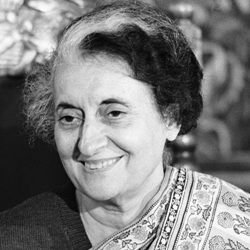
Life's Important Dates Of Feroze Gandhi
- LIFE EVENTS
- FAMILY EVENTS
Body Measurements
Personal info, shocking / interesting facts & secrets about feroze gandhi.
- He served as published in noted newspapers then like The Navjivan newspapers and The National Herald.
- To join Indian Independence movement, he quit his studies.
- He originally hailed from Bharuch city of Gujarat but migrated to Mumbai with his family in the early 1920s.
Feroze Gandhi Age, Birthday Facts and Birthday Countdown
Feroze Gandhi was 47 years 11 months & 26 days old age.
Birthday Calendar
Recommended for you.

Sarojini Naidu Biography, Age, Death, Husband, Children, Family, Facts, Caste, Wiki & More

Feroze Gandhi Biography, Age, Death, Wife, Children, Family, Facts, Caste, Wiki & More

A. K. Hangal Biography, Age, Death, Wife, Children, Family, Facts, Caste, Wiki & More

Tanguturi Prakasam Biography, Age, Death, Height, Weight, Family, Caste, Wiki & More

Bidhan Chandra Roy Biography, Age, Death, Height, Weight, Family, Caste, Wiki & More
Subscribe Now! Get features like

- 2024 US Elections
- Assembly Elections 2024
- ₹ 10 Lakh,1" data-value="Loan ₹ 10 Lakh">Loan ₹ 10 Lakh

- Entertainment
- Latest News
- Games & Puzzles
- Cyclone Dana Live Updates
- Diwali 2024
- Win iPhone 15
- The Taste of Time
- Web Stories
- Mumbai News
- Bengaluru News
- Daily Digest

The personal is the political: An excerpt from a new biography of Feroze Gandhi
Bertil falk’s biography of feroze gandhi reveals a democrat at loggerheads with his wife indira gandhi as a result of his belief in a federal india. the kerala crisis of 1957 possibly destroyed the marriage.
One of the states on the southernmost tip of India, Kerala had a population of about 20 million in 1959 – half were Hindus, while the other half comprised Muslims and Christians. As a matter of fact, Christianity probably reached the shores of Kerala as early as 52 AD, when St Thomas, also known as Doubting Thomas (because he is said to have doubted that the other ten apostles had seen the resurrected Jesus), a disciple (some say a twin brother) of Jesus Christ, landed at Cranganore. Nevertheless, Christianity was certainly well established in Kerala in the fourth century AD.
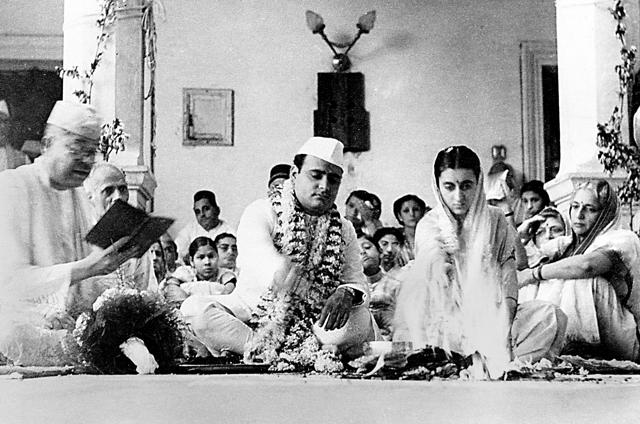
From a political point of view, Kerala at the time of Independence had a strong Muslim League and Communist presence. When the voters of Kerala in 1957 brought the Communist Party of India (CPI) into power it created quite a stir. For the first time in history, a Communist government had been elected rather than grasping power through revolution and occupation. No single party got the majority votes, but due to the electoral system, the Communist Party with more than 35 per cent of the votes was invited to form the government.
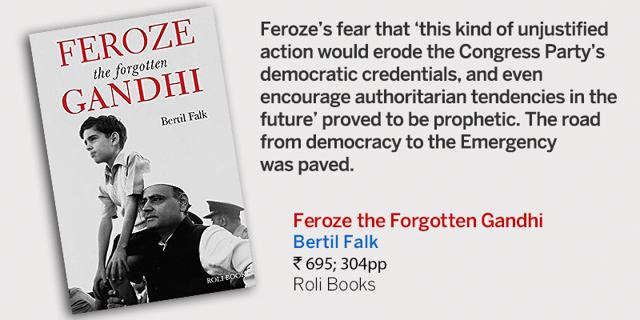
When the elected Communists began to pass their programme through the Kerala legislature it caused agitation and instability in the state. The Kerala government was led by EMS Namboodiripad. His government was a duly elected one and should, of course, not have been overthrown until, possibly, by the voters at the next general election.
Earlier governments in Kerala had promised land reforms, but it was the Communist government that decided on implementing them. Another reform was an Education Bill, which Inder Malhotra describes as ‘aimed at controlling and regulating the plethora of privately-run schools and colleges which had become a byword for waywardness. The Christian Church, the Muslim League and the Nair Service Society, all controlling numerous educational institutions and landed estates, were in the forefront of the agitation which soon developed into a mass movement for the removal of the Communist ministry.’
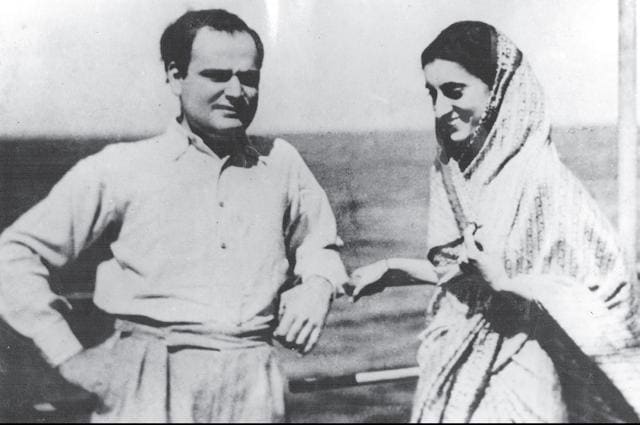
But when in some schools, the portrait of Mahatma Gandhi was replaced with portraits of Marx and Stalin, the agitation grew even stronger and became a storm. New Delhi, already somewhat obsessed with the apprehension that too independent and powerful state governments were a danger to the centre and the unity of the nation, became worried. Jawaharlal Nehru tried to persuade Namboodiripad to go slow with his reforms, but Namboodiripad refused. Voices in the capital were raised conveying the message that the Communist government in Kerala should be thrown out with force and presidential rule imposed.
Nehru was ambivalent. He did not like the situation in Kerala, but he knew that it was against the idea of democracy to dismiss a popularly elected state government, even though the CPI by definition itself was not a democratic party. As a matter of fact, when the CPI won the elections in 1957, Nehru had been almost proud that his India was such a good democracy that it permitted Communists to come to power – by legal means. He also considered it possible that the outcome of the Kerala elections would prove to other Communists around the world that there was a peaceful and democratic road to power.
Unlike her father, Indira, president of the AICC (All India Congress Committee) in 1959, had no democratic second thoughts when it came to crushing the elected government in Kerala or the elected government of any Indian state for that matter. The agitation in Kerala may have been fuelled by the reforms the CPI government went for, but even before the agitation in Kerala against the Communist rule was in full swing, Indira Gandhi grasped the opportunity. She orchestrated the unrest from New Delhi through her loyal AICC workers in the state. And she did it hand in hand with the communal Hindus in the state and with the Muslim League. The situation turned violent, the police opened fire against demonstrators and many died. Even though some of the blame must be put on the Communist rulers, this was also the first but not the last time that Indian blood was shed because of Indira Gandhi. Here she showed that she could be a stiff authoritarian and undemocratic leader and it paid off. She was soon on the verge of ensuring that she got her way.
While the situation in Kerala was tense, in the background there was Feroze and their disintegrating marriage. On 21 July 1959, Indira wrote to Dorothy Norman: ‘A veritable sea of trouble is engulfing me. On the domestic front, Feroze has always resented my very existence, but since I have become President he exudes such hostility that it seems to poison the air. Unfortunately he and his friends are friendly with some of our ministers and an impossible situation is being created.’
Then she switched to the big political problem: ‘The Kerala situation is worsening. This movement is not petering out as Communists claim but gathering momentum. The women, whom I have been trying to organise for years, had always refused to come into politics. Now they are out in the field. Over 8000 have been arrested. I have heard that in Europe and perhaps in America my father is being blamed for not taking any action.’ And here we discern that Indira Gandhi considers her father weak and indecisive: ‘He has given a very good lead from the beginning but he is incapable of dictatorship or rough-shodding over the views of his senior colleagues.’
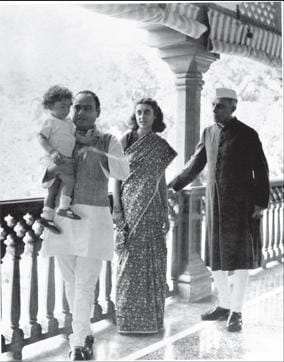
She continues in the same vein: ‘More and more I find that he is almost the only one who thinks in terms of ideology rather than personality. I cannot write much in a letter but you would be surprised that some of the ministers whom we had considered the most anti-Communist are now supporting the Communist government of Kerala. My father cannot go against the wishes of the Home Minister, for instance. It is a very ticklish situation.’ Indira Gandhi was not able to separate anti-Communism from accepting a popularly elected Communist government. And even though Nehru was ‘incapable of dictatorship and rough-shodding’, Indira was not. Ultimately Nehru, basically weak as he was, caved in to his daughter and did it her way.
Many years later, around 1976, she was interviewed by Emmanuel Pouchpadass, her biographer. When she looked back at the events in 1959, she played down her own role saying that ‘my part was not as important as it is now made out to have been.’
That was not her only rationalization. She also said that ‘the Marxists are always accusing me of having brought down their government. My recollection is that Mr Namboodiripad, who was the chief minister, did make a statement to the effect that the law and order situation was not entirely in their control, there was a strong public demand for a change of government. But it could never have been done had the Central Government not been willing. I did go to Kerala and I did report on the situation. My own opinion would not have changed things. The fact is that my father probably was not happy about the situation. I know Feroze was not happy about it.’
What an understatement!
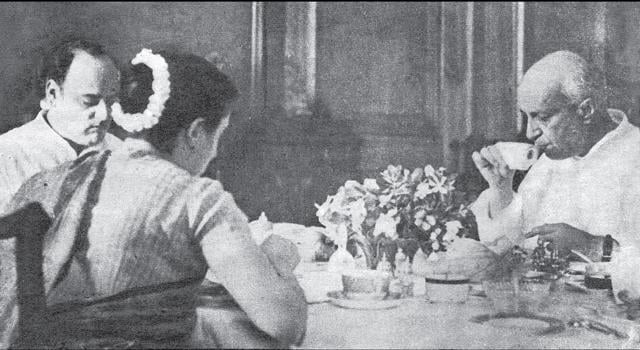
Feroze was furious, to say the least. He fought her with all means, through the press, via other politicians and face-to-face with her over the breakfast table at Teen Murti. According to Janardan Thakur, well-known political correspondent: ‘It was her husband who perhaps first called her a “fascist”, way back in 1959 when she was Congress President, Indira Gandhi had been lobbying hard for intervention in Kerala and Feroze had taken a stand against it. He thought it was undemocratic to dismiss an elected government, whether it was a communist government or otherwise. The issue had come up at breakfast table at Teen Murti, and there had been quite a row between Indira and Feroze, with Nehru looking on very distressed. “It is just not right,” Feroze had said, “you are bullying people. You are a fascist.” Indira Gandhi had flared up. “You are calling me a fascist. I can’t take that.” And she had walked out of the room in rage.’
Feroze lost the battle and President’s rule was imposed in the state. But even after losing the battle, Feroze nonetheless continued the struggle for democratic principles. For the next turn of events that happened was that the Congress under the presidency of his wife made the situation even worse to ensure that the Communists could not return to power. The Congress made an electoral and political alliance with the Indian Union Muslim League and other disputable elements in Kerala.
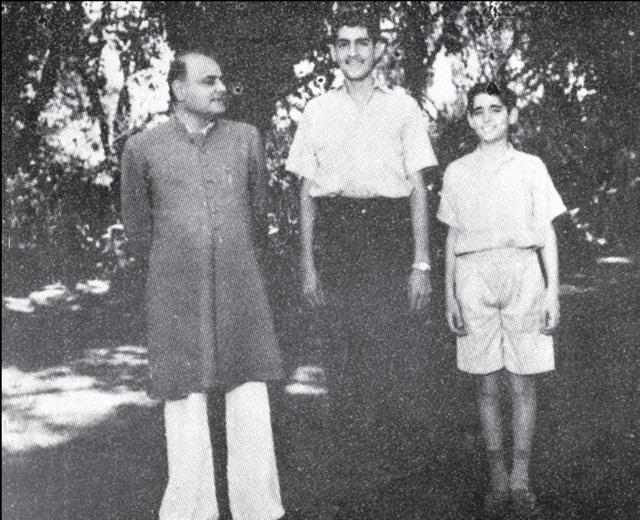
Feroze spoke out – not as a member of the Lok Sabha, but at a Congress meeting: ‘We intend to have electoral alliances in Kerala. I really do not know what it all means. We are going to have and we will have alliances with the Muslim League, with the leaders of caste, casteism. Where are we? Where is the Congress? Where are the principles of the Congress? Sir, Shri Padmanabhan Nair, the day that the President’s proclamation is issued, asked the Governor “come on, now suspend the Education Act, suspend Agrarian Reforms Bill”. Are we going to be dictated by a caste monster we have produced? Has the Congress organization come to this level? Has it fallen so low that we are going to be dictated [to] by communal elements, by leaders of caste and by those who can enthuse religious feelings into people and create situations where we get caught? Sir, tomorrow, if this is allowed to continue and this policy is allowed to work, we might as well have alliances with the Jana Sangh and we might as well have alliances with hundreds of other parties.’
And he concluded: ‘Today in Kerala you have forged the instrument of your own destruction. If this instrument is not destroyed, this instrument is going to destroy us. That is all that I have to say.’
Feroze’s colleague in the Parliament, Bali Ram Bhagat, shared with me in August 1998: ‘I still remember his words. He described it as a caste monster, as A Caste Monster and we are surrendering to A CASTE MONSTER.’
What was the reaction to his speech? Let us listen to an anonymous voice: ‘For the first time I felt that there was a complete silence in the Central Hall where the party meeting was held. For the first time I felt an impasse in the meeting had reached. The way out was inconclusive debate and allowing a good deal of passage of time before the next meeting.’
Heda, also a member of Parliament, shared: ‘Among the Congress members, Feroze had devoted himself to the study of the Constitution quite early. His speech in the Party meeting on 2nd August 1959, was devoted to it. He raised his voice against the imposition of President’s rule in Kerala. What surprised us most was that he did it almost single handed when both Prime Minister and Congress President, were so close to him. His emphasis was that we are not forming a pattern to determine the desirability or otherwise of the President’s Rule in any given situation. The final decision is that of the Central Leadership. But at the same time public in general should feel that certain norms were followed and the extreme step was taken after due warning.’
In another account, Feroze on this occasion in the Congress Parliamentary Board ‘spoke out forcefully against the Congress adventure in Kerala. He denounced his party – and, by implication, his own wife – for signing up with right-wing forces in Kerala. Nehru later told friends that he found Feroze’s remarks unforgivable.’
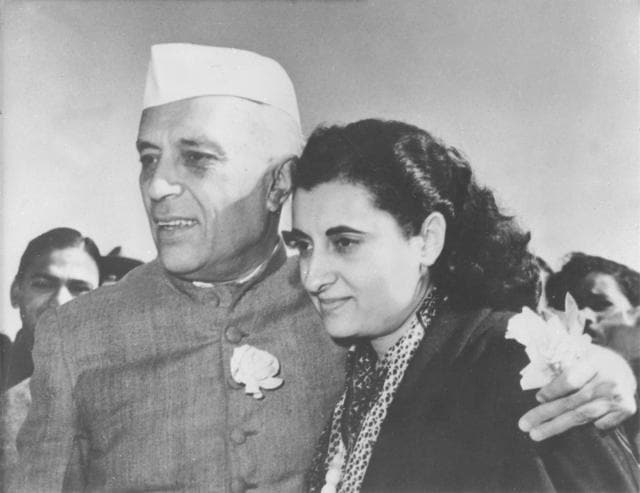
But Feroze was not alone. The Congress Parliamentary Board also denounced the intrigues and history has shown that the most unforgivable thing was that Nehru yielded to his daughter. Had Nehru been wiser he should instead have lent an ear to his son-in-law. It was Nehru who deserted his democratic principles, which were reduced to lip service.
In 1998, I had the opportunity in London to talk with Mary Shelvankar, who was a good friend of Indira Gandhi. Being a Marxist-Leninist, who met and admired Vietnamese Communist leader Ho Chi Minh and Chinese Communist Party’s Zhou Enlai, she could not have been overly happy when her friend Indira destroyed the first duly elected Communist government in the world.
When I mentioned the Kerala incident and the struggle between Feroze and Indira over her behaviour, Mary Shelvankar said: ‘Feroze and Indira were nationalists and socialists, but when it came to democracy their differences were almost total. Feroze was more of a federalist, while Indira subscribed to a rather authoritarian attitude. I knew Indira much better than Feroze. I was – and I still am – much more to the left than she was. I still consider Lenin a good man. When my husband was India’s ambassador to Hanoi, he ever so often went home to report. I met Indira many times and we had many discussions. Over the years, Indira and I argued and argued on a very friendly level. I thought that one should let people be as they are and permit them to be on their own, but she stuck to the concept of Mother India. She wanted all the power in her hands. She was against a federal India. In her opinion India was not enough developed to be a federal state. Feroze had a different approach. I only met Feroze two or three times in New Delhi during the 1950s. I never got close to him, because I felt that Indira did not want it. But from my discussions with Indira, I understood that Feroze was for a federal India and was against the centralized India she wanted.’
The elections in Kerala that followed Indira Gandhi’s successful intrigues showed that the Communist Party still had a very strong following. As a matter of fact, Indira and her allies succeeded through their acts to increase the support for the CPI from 35.28 to 43 percentage of the popular vote. In that sense, the agitation Indira had fuelled proved counter-productive. It rather, strengthened the popular base of the CPI than weakening it. Indira had shown her firm determination and iron will. Most other leaders of the Congress party not only demonstrated that they liked the fact that she subscribed to the Jesuit slogan that the end justifies the means. They exhibited poor judgement in another respect as well. They did not realize that she had displayed her mettle. The reason for their failure was perhaps that they may have shared her opinion in the actual point of issue. They may even have felt that she had carried out their wishes.
As a result of their blindness, they committed the big mistake a couple of years later of making her the prime minister of India. Dom Moraes wrote: ‘Room was made for her at the top by the combined efforts of certain Congress politicians, and her image then was that of a shy and reticent person, anxious to please her mentors. When the right hour came, she raised her pinions, shook off all encumbrances, and took to the upper air, flying over the country like the spirit of her childhood heroine…’ That heroine was Joan of Arc.
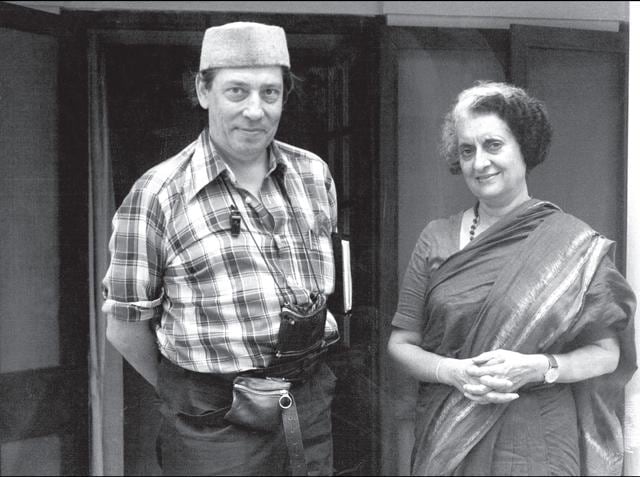
It is strange that she was able to uphold the impression of being a puppet for so long, even though she had come out in her true colours as early as in 1959 and that in a very decisive way, when she created the Kerala clampdown. But the fact is that the king- and queen-maker Congress leader from Tamil Nadu Kamaraj and the other responsible leaders of the so-called Syndicate, the breakaway party also called the Indian National Congress (Organization) that was formed when the Congress party split in 1969, did not understand the true face she showed during the Kerala crisis.
If Kamaraj had been more observant, keen and suspicious in 1959, he would have understood that Indira was not to be trifled with. He did not see the writing on the wall and committed his life’s political mistake to prefer her to Morarji Desai, something he later came to regret. It is of course always easy to be wise after the event, but the moment of truth finally dawned on him. When this otherwise very able and impressive Dr Frankenstein from Tamil Nadu understood that he had created a political monster, it was too late. He was himself cut to size, his powerbase eroded and he died disillusioned in 1975, with his creation standing by the side of his funeral pyre.
Read more: Gopalkrishna Gandhi on Feroze Gandhi The miscalculation of Kamaraj and his friends and the failure of the Syndicate to undo the mistake are however extraneous to our subject. Except for one important fact. If they had been more democratic and had listened to Feroze and his friends in the party and the press in 1959, they would have been able to avoid the biggest political blunder of their lives in 1966.
Feroze’s fear that ‘this kind of unjustified action would erode the Congress Party’s democratic credentials, and even encourage authoritarian tendencies in the future’ proved to be prophetic. The road from democracy to the Emergency was paved.
President’s rule is the euphemism used for the implementation of Paragraph 356 of the Indian Constitution, which provides for dismissing state governments in cases of misgovernance, lack of a majority in the legislature and so on. In accordance with her conviction that India was not developed enough to be a federal nation, Indira Gandhi used Article 356 no less than twenty-nine times between 1966 and 1977. President’s rule was also used nine times when the Janata regime was in power. And when Indira Gandhi was returned to power, she – in a vindictive mood – used or rather misused this tool eight times in 1980 alone. Steps have been taken in order to stop the galloping abuse of Article 356, but I have a feeling that more could be done.
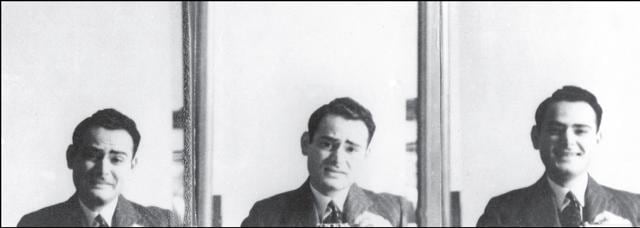
Now to be fair, Indira Gandhi reinstated the democracy she betrayed. When I asked her why she did so, she said that in a democracy it is not possible to keep an Emergency going for too long. At least and at last she understood that, but the Emergency was an expensive experience for India. And in the long run, Indira Gandhi after Operation Blue Star, when the Indian army stormed the Sikhs’ sacrosanct Golden Temple in Amritsar to flush out terrorists, had to pay an even higher price – her own life when she was assassinated by her Sikh bodyguards – for her ruthlessness than Kamaraj paid for his credulity.
In the long run, it is rather the legacy of Feroze than the legacy of his wife, that is alive and kicking. Indian democracy is at work at the national and the regional levels as well as the local level. Federal India is in many respects a democratic model for the world.
Join Hindustan Times
Create free account and unlock exciting features like.
- Terms of use
- Privacy policy
- Weather Today
- HT Newsletters
- Subscription
- Print Ad Rates
- Code of Ethics
- India vs New Zealand Live Score
- India vs Sri Lanka
- Live Cricket Score
- Cricket Teams
- Cricket Players
- ICC Rankings
- Cricket Schedule
- Shreyas Iyer
- Harshit Rana
- Kusal Mendis
- Ravi Bishnoi
- Rinku Singh
- Riyan Parag
- Washington Sundar
- Avishka Fernando
- Charith Asalanka
- Dasun Shanaka
- Khaleel Ahmed
- Pathum Nissanka
- Other Cities
- Income Tax Calculator
- Petrol Prices
- UGC NET Answer Key 2024 Live
- Diesel Prices
- Silver Rate
- Relationships
- Art and Culture
- Telugu Cinema
- Tamil Cinema
- Study Abroad
- Board Exams
- Exam Results
- Admission News
- Employment News
- Competitive Exams
- BBA Colleges
- Engineering Colleges
- Medical Colleges
- BCA Colleges
- Medical Exams
- Engineering Exams
- Love Horoscope
- Annual Horoscope
- Festival Calendar
- Compatibility Calculator
- Career Horoscope
- Manifestation
- The Economist Articles
- Lok Sabha States
- Lok Sabha Parties
- Lok Sabha Candidates
- Explainer Video
- On The Record
- Vikram Chandra Daily Wrap
- Entertainment Photos
- Lifestyle Photos
- News Photos
- Olympics 2024
- Olympics Medal Tally
- Other Sports
- EPL 2023-24
- ISL 2023-24
- Asian Games 2023
- Public Health
- Economic Policy
- International Affairs
- Climate Change
- Gender Equality
- future tech
- HT Friday Finance
- Explore Hindustan Times
- Privacy Policy
- Terms of Use
- Subscription - Terms of Use

Constitution of India
Home ≫ The Constitution Framers ≫ Feroze Ghandi
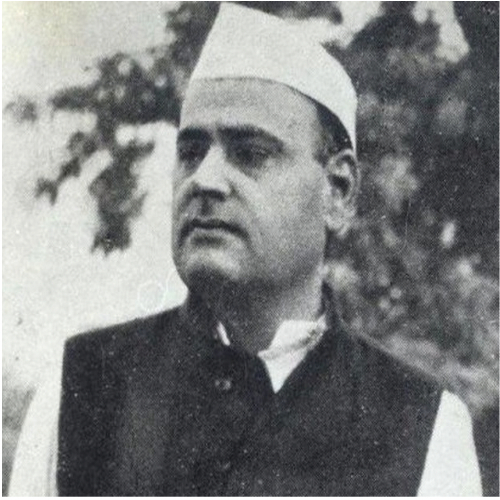
Constituent Assembly Members
Feroze Ghandi
1912 - 1960
Key Information
Party: Indian National Congress
Constituency: United Provinces
Religion: Parsi
Caste: Non SC/ST
Gender: Male
Mother Tongue:
Education: Graduate
Committee Memberships
Feroze Gandhi was born on 12 September 1912 in Bombay. He was a student at Ewing Christian College . In 1930, he quit his studies to join the Indian freedom struggle. Later, in 1935, Gandhi went to London to complete his education at the London School of Economics and obtained a B.Sc. degree. In London, he fully immersed himself in student politics.
Role in India’s Independence Movement
In the year 1930, Gandhi was imprisoned along with Lal Bahadur Shastri, when the British banned the Congress Party. After his release, he was imprisoned twice again in 1932 and 1933 while working with Jawaharlal Nehru on the agrarian no-rent campaign in erstwhile Uttar Pradesh.
As a student in England (1936- 1941) he actively participated in anti-fascism and pro-freedom struggle movements organised by Indian students. On returning to India, Gandhi was arrested and imprisoned for a year in 1942 at Allahabad for his involvement in the Quit India Movement.
Contribution to Constitution Making
Gandhi was elected to the Constituent Assembly from the United Provinces through a Congress ticket. He was not an active participant during the debates.
Later Contributions
He was a member of the Provincial Parliament (1950-1952). Gandhi won his first general election in the year 1952 from Rai Bareli, Uttar Pradesh.
After independence, in the year 1956, Feroze Gandhi introduced a private member’s bill to protect the freedom of the press. He believed that Indians had the right to know about Parliament’s day-to-day functioning. This bill led to the Parliamentary Proceedings (Protection of Publication) Act 1956 which allowed the media to report on Parliamentary proceedings.
In 1957 Gandhi was re-elected as a Member of the Parliament. He raised the issue of India’s first financial scam in the Lok Sabha and demanded an internal inquiry by an in-house committee. The investigation led to the resignation of the then finance minister, TT Krishnamachari.
Feroze Gandhi was married to Indira Gandhi, who became India’s first woman Prime Minister in 1966.
He passed away on 8 September 1960.
- Feroze: The Forgotten Gandhi by Bertil Falk
- Feroze Gandhi by Shashi Bhushan
- Join - It's Free
Welcome to Geni
Login to geni, or login with facebook, new to geni.
Your free family tree includes photo and video sharing, birthday reminders, events and timelines, and more!

Start Your Family Tree
- © 2024 Geni.com
- US State Privacy Notice
- Code of Conduct
- World Family Tree


IMAGES
VIDEO
COMMENTS
धर्म. पारसी धर्म. फ़ीरोज़ और इन्दिरा का विवाह. फ़ीरोज़ और इन्दिरा गांधी. फ़ीरोज़ गांधी (12 सितम्बर 1912 - 8 सितम्बर 1960) भारत के एक पारसी ...
और अधिक लेख: Quotes By Indira Gandhi. सोनिया गांधी की जीवनी. राहुल गांधी की जीवनी. राजीव गांधी का जीवन परिचय. Sanjay Gandhi biography. I hope these "Feroze Gandhi Biography" will like you. If you like these ...
स्वतंत्रता सेनानी , इंदिरा गांधी क पति और लोकसभा के प्रभावशाली सदस्य फीरोज गांधी (Feroze Gandhi) का जन्म 12 सितम्बर 1912 को मुम्बई के एक अस्पताल में पारसी परिवार में ...
Feroze Jehangir Gandhi (12 September 1912 - 8 September 1960) was an Indian freedom fighter, politician and journalist. He served as a member of the provincial parliament between 1950 and 1952, and later a member of the Lok Sabha, the Lower house of Indian parliament.He published The National Herald and The Navjivan newspapers.His wife, Indira Gandhi (daughter of Jawaharlal Nehru, the first ...
Hindi News Explainers Feroze Gandhi Birthday: फिरोज गांधी जितना गुमनाम रहे, उतनी ही आबाद रहीं इंदिरा, 'लव लाइफ' से लेकर 'सरनेम' बदलने तक की पूरी कहानी
फिरोज़ गांधी जीवनी (Feroze Gandhi Biograohy In Hindi) पूरा नाम. फिरोज जहांगीर गांधी. चर्चित नाम. फिरोज़ गाँधी. जन्म. 12 सितम्बर 1912 मुम्बई, महाराष्ट्र. मृत्यु. 8 ...
Feroze Gandhi Death Anniversary :इंदिरा गांधी के पति और राजीव-संजय गांधी के पिता फिरोज़ गांधी का जन्म 12 सितंबर 1912 को हुआ था. आइए जानते हैं कि फिरोज अपने जीवनकाल में किस तरह ...
Feroze Gandhi was born as Feroze Jehangir Ghandy on 12 September 1912, in Bombay, Bombay Presidency, British India, to Ratimai and Jehangir Faredoon Ghandy. He had two brothers, Faridun and Dorab, and two sisters, Aloo Dastur and Tehmina Kershashp. In the early 1920s, Feroze alongside his mother moved to Allahabad after the death of his father.
12 सितंबर 1912 को बॉम्बे में जन्में फिरोज गांधी (Feroze Gandhi) का नाम फिरोज जहांगीर घांडी। उनके माता-पिता, रती माई (Ratimai) और जहांगीर फरीदून घांडी (Jehangir Faredoon Ghandy) पारसी थे ...
Feroze was a student at the Ewing Christian College when, at the age of 18, he had his brush with the two forces that would change his life forever - the freedom struggle, and the Nehru family. Feroze Gandhi married Indira on March 26, 1942, on Ram Navami, at Anand Bhawan. (Photo: Wikimedia Commons) Jawaharlal Nehru's wife Kamala Nehru, who ...
Feroze Gandhi's Career. Feroze Gandhi joined the Indian independence movement in 1930. Inspired by Mahatma Gandhi, he changed his surname from "Ghandy" to "Gandhi". During this time, he spent nineteen months in Faizabad jail and supported the agrarian no-rent campaign in the United Province. As a result, he was imprisoned twice.
Feroze Gandhi Biography. Feroze Gandhi (1912-1960) was an Indian veteran journalist and politician. He served as a Managing Director of a Daily paper "National Herald" which was founded by his father-in-law Jawaharlal Nehru and also done their duty as a publisher of "The Navjivan" a daily newspaper from Lucknow which was firstly published by Mahatma Gandhi.
Feroze Gandhi. Feroze Gandhi or "Ghandy"[1] Born 12 September 1912, Mumbai Died: 8 September 1960, New Delhi Full name: Feroze Jehangir Ghandy Spouse: Indira Gandhi (m. 1942-1960) Resting place: Prayagraj Parents: Faredoon Jehangir Ghandy, Ratimai Commissariat. He was an Indian freedom fighter, politician and journalist.
Short Biography. Feroze Gandhi, born on 12-09-1912 in Bombay, India (now Mumbai, Maharashtra, India). He was an Indian Freedom Fighter, Journalist, Writer, Editor, Activist, Politician & husband of Indira Gandhi (1st woman Prime Minister of India), and the son-in-law to Jawaharlal Nehru.
Nov 26, 2016 09:36 AM IST. Bertil Falk's biography of Feroze Gandhi reveals a democrat at loggerheads with his wife Indira Gandhi as a result of his belief in a federal India. The Kerala crisis ...
Feroze Varun Gandhi. Date of Birth. 13 Mar 1980 (Age 44) Place of Birth. New Delhi. Party Name. Bharatiya Janta Party. Education.
Feroze Gandhi was a freedom fighter, prominent parliamentarian and crusader against corruption. This piece traces the various threads in his rich life, including his joining the Nehru family ...
Feroze Gandhi was born on 12 September 1912 in Bombay. He was a student at Ewing Christian College. In 1930, he quit his studies to join the Indian freedom struggle. Later, in 1935, Gandhi went to London to complete his education at the London School of Economics and obtained a B.Sc. degree. In London, he fully immersed himself in student politics.
About Feroze Jehangir Gandhi. Feroze Gandhi (12 September 1912 - 8 September 1960) was an Indian politician and journalist, and publisher of the The National Herald and 'The Navjivan' newspapers from Lucknow. [3] He became the member of the provincial parliament (1950—52), and later a member of the Lok Sabha, the Lower House of India's ...
Feroze Gandhi [*] [ (26 martie 1942 - 8 septembrie 1960) Copii: Rajiv Gandhi ... Nehru era unul dintre cei mai proeminenți membri ai Congresului Național Indian din era pre-Gandhi, fiind autorul Raportului Nehru care a fost alegerea poporului pentru un viitor sistem indian de guvernare opus sistemului britanic.